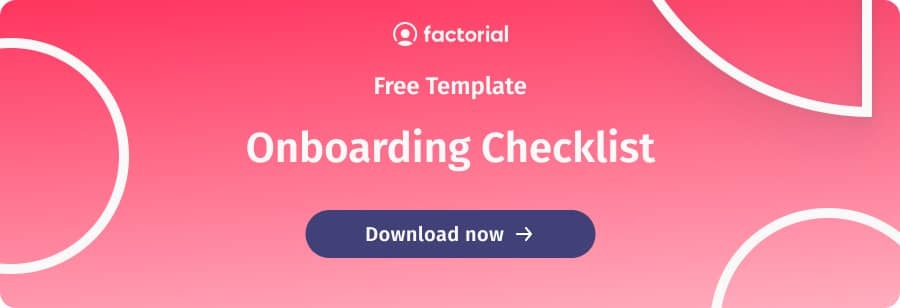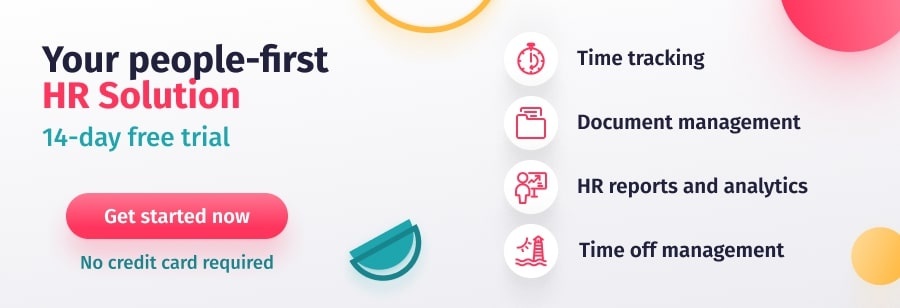Creating an engaging employee experience is one of the key drivers of a successful business. It sets the stage for increased loyalty and higher retention levels. However, it’s important to remember that the employee experience doesn’t start when a new hire first walks through your door. You need to make sure you create a positive experience from the moment they accept your job offer. In fact, good preboarding and onboarding not only increases staff retention by 82%, but it also increases employee productivity and improves your reputation.
In today’s post, we are going to share a comprehensive preboarding guide with you. We will define preboarding, look at onboarding vs orientation, and share a pre-onboarding checklist so that you can give your new starters the warm welcome they need in order to become a happy and productive member of staff.

What is Preboarding?
Let’s start with a preboarding definition.
Preboarding, also known as pre-onboarding (in case you were wondering “is it preboarding or pre-boarding?”), is the period of time that occurs between a candidate’s acceptance of your job offer, and their first day working at your company. This period might be a matter of days, or in the case of new starters who have to work extensive notice periods – several months.
The aim is to spend this time familiarizing a new hire with their role and your organization so that they are ready to hit the ground running on day one. This helps them feel welcome, engaged, and valued so that they are ready and excited to join the team. It’s also a great opportunity to complete any necessary administrative tasks so that the onboarding stage can be more focused on introductions to new colleagues and the practical side of their induction.
Preboarding vs. Onboarding
It’s important to understand the difference between employee preboarding and employee onboarding.
So, what is onboarding?
Onboarding is the period between your new hire’s first day on the job and the end of their induction into the company. It is an opportunity for incoming employees to find out more about the organization, their role, who their co-workers are, the philosophy of the company, and much more.
The process consists of a series of orientation events designed to aid employees to integrate into their departments. This might include an office tour, giving employee ID numbers, and setting up workspaces. This differs from preboarding, which occurs in the period before an employee’s first day.
Benefits of Preboarding Employees
In the past, not much was done with new starters during the pre-onboarding phase. A candidate would accept an offer and then wait in anticipation until their eventual introduction to the company on their first day. However, increasing numbers of companies are realizing the benefits of engaging new hires from the moment they are hired.
Here are just a few of those benefits:
- Preboarding gives you the opportunity to share your mission, vision, values, and culture with a new hire before they join the team. This helps new employees align with your organization in advance. What’s more, if new hires are able to meet their team before their first day, then it also helps them bond with their future colleagues.
- By providing a new hire with basic information about their role in advance you can help them feel comfortable and ready to embrace their onboarding, orientation, and induction period.
- Pre-onboarding also offers a valuable opportunity to complete all admin in advance so that the new hire can focus on meeting the team on their first day instead of completing endless tax forms and non-disclosures. This helps to improve the employee experience.
- Engaging new hires from the moment you hire them is also a great way to make a good first impression. The employee is able to begin developing relationships and emotional attachments before their first day. This reduces time to productivity and boosts employee engagement, motivation, and retention.
Preboarding Checklist: Steps in the Preboarding Process
The experience you offer during the pre-onboarding stage sets the benchmark for what an employee can expect from their overall experience with your organization. It’s the first real impression a new hire has about you, so it can have a big impact on whether or not they choose to remain at your company. This means it is vital that you build a formal pre-onboarding process so that you give new employees the best possible start in their employment with you.
With this in mind, we have put together a pre-onboarding checklist so that you include all the important steps in your preboarding process.
Welcome to the Team!
The first stage in the preboarding process is welcoming your new hire to the team. It may sound simple, but a quick, informal email or phone call can help your soon-to-be new employee feel comfortable and valued. This will help them understand that you are there to help with anything they need in the run-up to their first day, and hopefully reduce their first-day nerves.
Complete Admin Tasks
As we mentioned already, preboarding is a great opportunity to get any boring admin tasks out of the way before a new hire’s first day. That way, instead of spending it signing forms and setting up accounts, they can focus on getting to know their new colleagues and understanding the company culture.
Onboarding documents will usually include tax forms, contracts, and NDAs, activating company accounts, verifying personal details, adding personal information to payroll software, and completing relevant government employment documents. You can use digital onboarding tools or onboarding software to further improve the employee experience.
If you’re not sure what to include, check out Factorial’s onboarding checklist to help you keep track of the process.
Share Company Policies
Send your company handbook to your new starters so that they have time to review it before their first day. You could also create a handy FAQ sheet answering common informal questions. For example, you could share details about your dress code, parking, where people go for lunch, etc.
This will help them understand what you expect of them and the internal guidelines they will need to follow. Then if they have any questions they can address them in advance so that everything is clear before they start.
You can also use this opportunity to share any information that will help the new hire prepare for their role. For example, if you work in manufacturing, you can share information about Good Manufacturing Practices in advance so that new hires can begin familiarizing themselves with materials and equipment.
Announce New Arrival
The next important stage of the preboarding process is introducing new arrivals to the team.
You can start by sending out a company-wide email announcement with a bit of information about the new starter. You could even get them to send out their own personalized introduction email. As simple as it sounds, this simple action can help your new hires feel valued. It’s also a great way to drum up excitement within the department and cultivate a sense of community.
Invite Them to a Company Event
Finally, if you have a company event coming up, invite the new hire to come along and meet the team. Or if everyone works remotely, you can organize a digital meet-up instead. This gives new hires the opportunity to meet their new colleagues in an informal setting.
This will help them build relationships and break the ice. And this, in turn, will make their first day seem far less stressful. Nothing beats a familiar face, after all.
Tips for Preboarding New Hires
Let’s finish by looking at a few pre-onboarding tips to keep in mind as you launch your program.
- Make sure you provide new hires with everything they need for a successful first day. Ideally, this should include a comprehensive first-week schedule and access to pre-start training where possible.
- Try to get the new hire to complete as much admin as possible during the preboarding phase. This will enable them to focus on the practical side of their introduction to your company on their first day. For example, meeting their new colleagues and, most importantly, finding out where the coffee machine is!
- Create an onboarding video to introduce new hires to your company. Use this to showcase your company values and share staff testimonials.
- Introduce a preboarding buddy system for new hires. This will give them the support they need if they have any questions.
- Be as proactive as possible during the preboarding period. This will leave less formal stuff for their first day. For example, you can use this period to set them up with an email account and prepare any equipment.
- Finally, and most importantly, preboarding is all about communication. Touch base with your new hires regularly in the run-up to their first day. Find out if they have any questions. Share updates about company news or upcoming projects to help them integrate with your organization. This is the best way to ensure they are engaged and motivated from day one.
